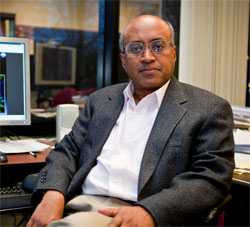Scientific Program

Venkatachalam Ramaswamy
Geophysical Fluid Dynamics Laboratory, USA
Title: Earth’s climate in the 20th and 21st Centuries: Pollution and climate change
Biography:
Venkatachalam Ramaswamy is the Director of NOAA’s Geophysical Fluid Dynamics Laboratory (GFDL), one of the world’s premier climate modeling centers, and the Professor in the Atmospheric and Oceanic Sciences Program at Princeton University. He received his PhD in Atmospheric Science from the State University of New York at Albany in 1982. His research focus is the mathematical modeling of the global climate system, advancing the understanding of atmospheric physics and chemistry, and investigating climate changes. He has published over 160 papers in refereed journals, won many prestigious awards, and author/reviewer on the Intergovernmental Panel on Climate Change.
Abstract
The emissions of greenhouse gases due to human influences has caused perturbations in the Earth system, initiating major changes in the greenhouse effect and leading to global warming. Other factors such as aerosol emissions and land-use change also due to human activity, along with changes in solar radiation and volcanic eruptions causing aerosol increases, have also affected the planetary heat balance. In this presentation, we discuss how each of the natural and anthropogenic factors has contributed to alteration of the Earth system from global to continental to regional scales. The climate variables of particular interest for societal impacts are temperature, precipitation, and weather extremes. For this investigation, we use state-of-the-art numerical models of the climate system, together with observations drawn from multiple platforms (surface, satellite, and aircraft). We analyze the key drivers over the 20th Century, the impacts they have generated, and the unresolved issues. We then explore the impacts that are expected in the 21st Century. In the context of both the 20th and 21st Centuries, we discuss the impacts expected due to global warming and the significance of the resulting climate change for extremes in weather e.g., heat waves, tropical storms, sea-level rise, forest fires, droughts, excess rainfall. This brings to the fore the connection between the scientific understanding of pollution and global warming based on rigor, and the manner in which climate change impacts society including that arising due to the nonstationary behaviour of the changes.
- Water Management
- Agriculture and Bioresources
- Climate Change and Climatology
- Earth Science
- Toxicology and Environment Health
- Global Warming
- Pollution and Climate Change
- Carbon Farming & Carbon Cycle
- Natural Hazards and Disaster Management
- Oceans and Climate Change
- Environmental Designing
- Sustainability and Climate Change
- Renewable Energy to Mitigate Climate Change
- Green Initiatives, Products and Climate Change
- Climate Hazards & Refugees
- Ecology and Ecosystems
- GIS, Remote Sensing and Geospatial Sciences

